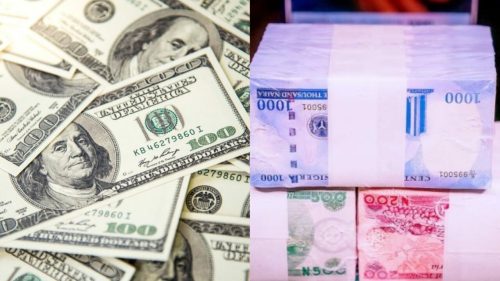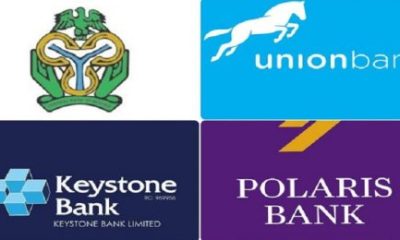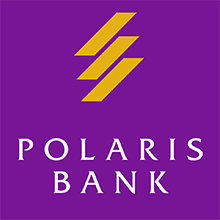Business
2023 World Environment Day: Polaris Bank restates commitment to environmental sustainability in Nigeria

Polaris Bank, Nigeria’s leading digital financial institution, has restated its commitment to environmental sustainability in the country.
The Bank’s commitment is coming on the heels of the 2023 World Environment Day observed yearly on June 5. The annual event is led by the United Nations Environment Programme (UNEP) which is observed globally to encourage awareness and action for the protection of the environment. This year marks the 50th anniversary of the event.
The theme of the 2023 World Environment Day is “Solutions to plastic pollution” with the hashtag #BeatPlasticPollution. Plastic pollution is a major environmental problem. Every year, millions of tons of plastic waste end up in our oceans, landfills, and waterways. This plastic can harm wildlife, pollute our air and water, and contribute to climate change.
Specifically, and in line with the theme of the 2023 World Environment Day, Polaris Bank has taken proactive measures to address challenges of waste management and plastic pollution while supporting the United Nations’ Sustainable Development Goals (SDGs), Nigerian Sustainable Banking Principles (NSBPs) and United Nations Environment Programme Finance Initiative (UNEP FI’s) Principles of Responsible Banking
Polaris Bank as part of its environmental sustainability focus has invested in waste management, plastic collection, renewable energy adoption, education, inclusivity, and carbon reduction. By implementing sustainable practices and guidelines, the Bank contributes to individuals’ needs and societal goals while ensuring a responsible and environmentally conscious business strategy.
“In managing the environmental impact of its activities, Polaris Bank has made significant efforts to reduce carbon emissions and dependence on fossil fuels. Through the use of solar energy to power security lights, some ATMs and business locations, as well as implementing automated systems and digital alternatives to paper output, the Bank actively mitigates waste generation and reduces its carbon footprint.
“To further minimize its carbon footprint, Polaris Bank has streamlined its vehicle fleet, while most meetings and engagement are held virtually. By prioritizing sustainable energy sources and expanding its network of ATMs, including prestigious off-site locations, the Bank ensures convenient and eco-friendly access to banking services,” the Bank explained in a statement on Monday.
The Bank took it’s commitment a step further by partnering with some organizations to help it provide clean water and sanitation in some communities. It’s Corporate Social Responsibility (CSR) projects are clearly spelt out to reflect adherence to environment sustainability.
“Additionally, through partnerships with organizations like the United Nations Association of Nigeria (UNAN), we contributed to providing clean water and enhanced sanitation to local communities in Lagos state.
“We also partnered with the non-profit organization Evolve, to launch the Girl Child Education and the Environment CSR program. This initiative strives to keep the girl child in school, and educated thereby reducing early marriages and population explosion which impacts the Climate. This empowers underprivileged girls through education, providing them with school supplies and personal development tools. By supporting over 3,000 female students from 12 secondary schools nationwide, Polaris Bank fosters individual growth and inspires positive contributions to society.
“Polaris Bank’s dedication to environmental sustainability is a key component of its broader vision to create a positive and lasting impact on society. As part of the commemoration of the 2023 World Environment Day, the Bank has established dedicated plastic collection hubs across its branches in Lagos. These hubs serve as convenient drop-off points for responsible disposal of plastic waste for onward recycling, while empowering individuals and communities to actively participate in reducing plastic pollution.”
Business
Black Market Dollar To Naira Exchange Rate Wednesday, 15th May 2024

Black market dollar to naira exchange rate Wednesday 14th May 2024 can be accessed below.
IMPORTANT NOTE: The exchange rate changes hourly.… it depends on the volume of dollars available and the Demands. It means that…you can buy or sell 1 dollar at a certain rate and the price can change (high or low) within hours.
JomogNews Nigeria has obtained the official naira black market exchange rate in Nigeria today including the Black Market rates, Bureau De Change (BDC), and CBN rates. Please note that the exchange rate is subject to hourly fluctuations influenced by the supply and demand of dollars in the market. As of now, you can purchase 1 dollar at a certain rate now, however, it’s important to keep in mind that the rate can shift (either upwards or downwards) within hours.
What is the dollar to naira exchange rate today?
The local currency (abokiFx) opened at ₦1,530 per $1 at the parallel market otherwise known as the black market, today, Wednesday, 15th May 2024, in Lagos Nigeria, after it closed at ₦1,530.00 per $1 on Tuesday, 14th May 2024.
Dollar to Naira (USD to NGN) Black Market Exchange Rate Today
Buying Rate of $1 ₦1530
Selling Rate of $1 ₦1,550
How does the black market dollar-to-naira exchange rate compare to the official rate?
The official exchange rate of the US dollar to the Nigerian naira, as of today, 15th May 2024, is N1450.40 per US dollar.
This is the rate that the CBN uses for its transactions and interventions in the foreign exchange market. The official rate is also the basis for the exchange rates of other foreign currencies, such as the euro, the pound sterling, and the Chinese yuan.
The difference between the black market rate and the official rate is called the parallel market premium. The parallel market premium indicates the degree of divergence between the official and unofficial markets and reflects the level of confidence in the naira and the CBN’s policies.
Factors Influencing Foreign Exchange Rates
Here are some of the causes of the dwindling dollar-to-naira exchange rate.
Inflation Rates: It is well known that inflation directly impacts black market exchange rates. If the Nigerian economy can be stabilized and inflation is controlled, the naira will benefit; however, if the naira continues to fall, it may indicate that food and other necessities are becoming more expensive daily.
Interest Rates: Another tool to keep an eye on is interest rates. If the interest rate at which banks lend money rises, it would harm the economy, causing it to contract and, as a result, the value of the naira to fall.
Government Debt: National debt can impact investor confidence and, as a result, the influx of funds into the economy. If inflows are high, the naira exchange rate will rise in favour of the naira.
Speculators: Speculators frequently impact the naira-to-dollar exchange rate. They stockpile money in anticipation of a gain, causing the naira to plummet even lower.
Conditions of Trade: Favorable trade terms will increase the value of the naira to the dollar, although Nigeria is currently experiencing a trade deficit. Everything comes from China, India, and the majority of Asian countries.
Disclaimer: JOMOGNEWS NIGERIA does not set or determine forex rates. The official NAFEX rates are obtained from the website of the FMDQOTC. Parallel market rates (black market rates) are obtained from various sources including online media outlets. The rates you buy or sell forex may be different from what is captured in this article.
Business
Analysts Place “Buy” On Fidelity Bank

Highly-rated, independent investment advisory firms have picked Fidelity Bank as a very attractive stock with potential to generate high returns for investors.
Independent investment research reports by many market pundits reviewed at the weekend showed that Fidelity Bank was assigned “buy” ticker, a recommendation to investors to consider the potential attractive returns of the bank.
The research reports were based on the historical and current operational performances of the bank as well as the clear-sighted implementation of the bank’s growth plan. The reports also considered the quality of board and management and the general human capital and resources of the bank.
The investment advisory reports included those of Afrinvest Group, FSDH Capital and CardinalStone among others.
Analysts were unanimous that Fidelity Bank’s share price could double in the period ahead given professional assessment of top traditional performance parameters including the company’s operational reports, investors’ preference and projections.
CardinalStone stated that Fidelity Bank’s share price could double citing the bank’s “robust earnings growth” and the increasing profitability of its core banking operations.
After an extensive review of the global and domestic stock markets, FSDH Capital selected Fidelity Bank as one of the “FSDH Top Picks”, a group of stocks that the investment advisory firm considered to be most attractive for discerning investors. FSDH Capital’s stock selection considered a stock’s pricing history, dividend history, fundamental values and peer ratios among others.
Providing background on analysts’ exhaustive research for stock selection, Afrinvest explained that the company’s fair value estimate “takes into account a weighted average of price estimates derived from a blend of valuation methodologies including the Discounted Cash Flow (DCF) and its variants as well as other relative and comparable trading multiples valuation models”.
“However, we attach the most weight to DCF valuation methodology, particularly the Dividend Discount Model (DDM), Free Cash Flow (FCF) model and Residual Income Valuation/Model (RIV/RIM). The utilization of comparable trading multiples is guided by the analysts’ understanding of the banks’ fundamentals, as well as key price drivers from the firm, industry and macroeconomic perspectives,” Afrinvest stated.
The “buy” rating, according to analysts, implies that “the expected total return over the next 12 months is 25 per cent or more. Investors are advised to take positions at the prevailing market price as at the report date”.
Afrinvest projected that Fidelity Bank, with a dividend yield of 9.3 per cent, has price upside potential of more than 35 per cent. This effectively makes the stock an inflation-hedging stock, implying that investors in the bank’s shares can retain money value despite the current inflationary environment.
Futureview Group said Fidelity Bank’s recent operational reports highlighted the bank’s “excellent operational performance and the breadth of its income sources”.
The audited report and accounts of Fidelity Bank for the year ended December 31, 2023 had shown that gross earnings rose by 65 per cent to N555.83 billion. The top-line performance was driven by significant growths across income lines including 55 per cent growth in interest income, 562 per cent increase in other operating income and 44 per cent growth in fee and commission income.
The bottom-line fared better with net profit after tax rising by 99 per cent to N99.46 billion in 2023. Earnings per share (EPS) thus jumped by 93 per cent to N3.11, providing a strong buffer for the bank to increase dividend payout without undermining its sustainability.
Interim report and account of the bank for the first quarter ended March 31, 2024 also showed that the bank started the current business year on stronger footing with three-digit growths across key performance indicators.
The three-month report, released at the Nigerian Exchange (NGX), showed that gross earnings increased by 89.9 per cent to N192.1 billion in first quarter 2024. The bank’s top-line performance continued to be driven by broad-based growths across income lines with interest income rising by 90.7 per cent and non-interest income growing by 84 per cent in first quarter 2024.
Growth in interest income was primarily spurred by a higher yield environment and strong earning assets base, while the increase in non-interest income was led by double-digit growth in account maintenance charges, foreign exchange (forex)-related income, trade, banking services, and remittances, supported by increased customer transactions.
Profit before tax doubled by 120 per cent to N39.5 billion in first quarter 2024 as against N17.9 billion in first quarter 2023. The bank’s performance was driven by expanding market share with total deposit rising by 17 per cent within the three months to N4.7 trillion, compared with N4 trillion recorded at the end of 2023. The bank also increased its supports for national economic growth with net loans and advances rising by 21 per cent from N3.1 trillion at the end of 2023 to N3.7 trillion by March 2024.
Managing Director, Fidelity Bank Plc, Nneka Onyeali-Ikpe said the bank’s performance was due to its strategic focus on customer-centricity, digital innovation and operational excellence.
“Despite the challenging macroeconomic environment, we remained resilient and agile, delivering double-digit growth on key income lines while advancing our business sustainability agenda.
“Beginning the year on this inspiring note reaffirms our strategy of helping individuals to grow, inspiring businesses to thrive and empowering economies to prosper. We are committed to our guidance as we build a more resilient business franchise with a well-diversified earnings base in 2024,” Onyeali-Ikpe said.
Ranked as one of the best banks in Nigeria, Fidelity Bank is a full-fledged customer commercial bank with over 8.5 million customers serviced across its 251 business offices in Nigeria and the United Kingdom as well as on digital banking channels.
The bank has won multiple local and international awards including the Export Finance Bank of the Year at the 2023 BusinessDay Banks and Other Financial Institutions (BAFI) Awards, the Best Payment Solution Provider Nigeria 2023 and Best SME Bank Nigeria 2022 by the Global Banking and Finance Awards; Best Bank for SMEs in Nigeria by the Euromoney Awards for Excellence 2023; and Best Domestic Private Bank in Nigeria by the Euromoney Global Private Banking Awards 2023.
Business
AltBank Walks Against Hunger and Advocates for Education

The Alternative Bank Limited (AltBank) has announced a strategic collaboration with FoodBankFoodBank and Sterling One Foundation to raise approximately N20 million in support of hunger alleviation and educational initiatives.
This initiative aligns with the theme of the African Union Summit 2024, “Educate and Skill Africa for the 21st Century.”
Hassan Yusuf, the Managing Director of The Alternative Bank, unveiled this plan in a press release, highlighting the forthcoming AltWalk event as a pivotal fundraising platform. “Through this initiative, we aim to mobilize contributions from both internal and external stakeholders, reaffirming our commitment to education and societal welfare,” stated Yusuf.
The fundraising campaign aims to secure N20 million, with the proceeds serving dual purposes: providing meals for underserved communities and orphanages through the FoodBank initiative and delivering quality educational support via Sterling One Foundation.
This campaign targets individuals, families, businesses, and organizations committed to ending hunger, improving education, fostering healthy living, and positively impacting society.
Prospective donors are encouraged to contribute through https://altbank.ng/walk/.
Stakeholder participation and donations are poised to substantially impact critical social issues, including hunger reduction, enhanced education, and healthier lifestyles.
Yusuf emphasized AltBank’s dedication to empowering customers through innovative solutions in health, food security, and education, positioning them for success in the 21st century. He stressed that education is central to the bank’s mission of bolstering the economy and enhancing financial well-being across society.
AltBank, Nigeria’s most recent entrant into the financial services sector, made a grand entrance with simultaneous launch events in Lagos, Abuja, and Kano, marking the country’s first multi-city brand launch.
As the ethical banking arm of Sterling Financial Holdings, The Alternative Bank originated in 2014 as Sterling Alternative Finance under Sterling Bank Plc’s non-interest banking license. It has since evolved into a prominent player in Nigeria’s non-interest banking sector.
-

 News16 hours ago
News16 hours agoAlleged Corruption: Rights Lawyer Petitions Minister, Seeks Suspension Of NSCDC CG, Audi
-

 Security & Crime15 hours ago
Security & Crime15 hours agoTragedy As Father Of 2 Electrocuted On High Tension Pole In Bayelsa
-

 Security & Crime2 days ago
Security & Crime2 days agoOyo: Gunmen Kill Security Guard, Abduct SAN’s Sister
-

 Breaking News1 day ago
Breaking News1 day agoJust In: Fire Guts NNPCL Apapa Tank Farm
-

 Breaking News14 hours ago
Breaking News14 hours agoTragedy As Truck Rams Into BRT Bus on Lagos-Ibadan Expressway
-

 Entertainment17 hours ago
Entertainment17 hours agoE-Money And I Will Cater For Junior Pope’s Children Till They Grow Up – Kcee
-

 Health2 days ago
Health2 days agoNursing Mother Stranded In Hospital, Alleges Husband Diverted Medical Fund
-

 Celebrities12 hours ago
Celebrities12 hours agoI’m Still A Member, Steward Of Winners Chapel – Isaac Oyedepo














